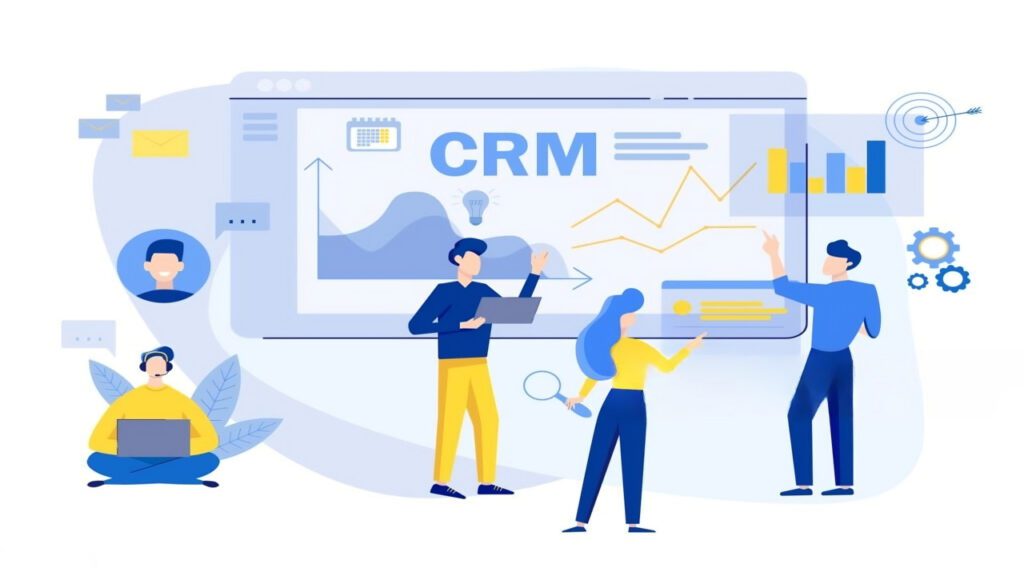
A CRM for service business is no longer a nice-to-have, it is the operating system for modern providers.
Whether you run a cleaning crew, a clinic, a creative studio or a consulting shop, the right platform keeps bookings tight, conversations timely and cash flow clear. As expectations rise in the CRM for service industry, owners need a single hub that replaces scattered spreadsheets and disconnected apps.
In this guide, you will learn what to look for, how leading tools compare, and where a system can lift margins and customer happiness. By the end, you will have a short list of the best CRM for service business in 2025 and a practical adoption plan that fits your size and budget.
Table of Contents
ToggleWhy a CRM Matters for Service Teams in 2025
Customers expect instant replies, self-serve booking and personalized follow-ups. Delivering that with manual workflows is hard and expensive. A focused CRM for service industry solves the daily grind and unlocks growth.
Benefits briefly
- Time savings with automated scheduling, reminders and invoicing
- Happier clients through consistent updates and on-time service
- Revenue lift from pipeline visibility and upsell prompts
- Scalability as you add staff, services and locations
Key Features to Look for in a CRM for Service Business
Not every CRM understands booking windows, field assignments or recurring visits. Prioritize features that reflect how services run.
1. Appointment and booking management
Online scheduling, calendar sync and automatic reminders reduce no-shows. If your day is appointment-driven, this is non-negotiable.
2. Client and job history in one place
A strong CRM for small businesses records preferences, quotes, signed approvals, past visits and invoices under a unified profile. Personal context fuels better service.
3. Project and task tracking
Many engagements span weeks. The best CRM and project management for small business blends pipelines with checklists, files and internal notes so handoffs are clean.
4. Invoicing and payments
Built-in invoices, deposits and overdue alerts shorten the cash cycle. Look for native payments or tight accounting integrations.
5. Omnichannel communication
Email, SMS and chat from the same timeline keep the team aligned. Clients should be able to reply on the channel they prefer.
6. Reporting and dashboards
Know which services convert, which techs are overbooked and which channels drive the best leads. Decisions beat hunches.
Example: A small clinic added SMS reminders and reduced no-shows by a third in the first month. The slots saved became new revenue without extra marketing.
The Best CRMs for Service Business in 2025
Below are vetted picks that fit real service workflows from home services to agencies and clinics. Each can anchor a CRM for service business rollout this year.
1. HubSpot CRM
Why it fits: Generous free tier, clean interface, robust ecosystem. Add marketing and help desk when ready.
Highlights
- Contact and deal management
- Meeting links and booking
- Email tracking and sequences
- Marketplace of integrations
Best for: Owners who want a flexible CRM for small businesses that scales without replatforming.
Example: A consulting firm sends booking links to prospects, tracks calls and triggers post-meeting summaries no more manual nudges.
2. Zoho CRM: Best for Custom Workflows
Why it fits: Affordable, modular and deeply customizable. Pair with Zoho Bookings, Projects, and Books.
Highlights
- Appointment scheduling
- Custom fields and modules
- Strong reporting and dashboards
- Native finance and project apps
Best for: Teams with unique processes and multi-step jobs.
Use blueprints to enforce handoffs (quote → approval → scheduled → invoiced) so nothing slips.
3. ServiceTitan: Best for Home Services (HVAC, Plumbing, Electrical)
Why it fits: Purpose-built for field operations with dispatch, parts, estimates and mobile apps.
Highlights
- Real-time dispatch and GPS
- Tech mobile workflows
- Estimates, invoices and payments
- Automated customer updates
Best for: Trades that live on trucks and timelines. This is often the best CRM for service business if you dispatch crews daily.
Example: A plumbing shop books jobs, routes techs and sends digital invoices from the driveway no paper trail to reconcile later.
4. Freshsales
Why it fits: Fast setup, AI lead scoring and built-in telephony make it friendly for smaller teams.
Highlights
- Pipeline and tasks
- Email, chat and phone
- Scheduling and reminders
- Freshworks help desk add-ons
Best for: Owners who want a simple CRM for small businesses with minimal onboarding time.
5. Jobber: Best for Field Service SMBs
Why it fits: Scheduling, routing and reminders built around recurring site visits.
Highlights
- Online booking and calendars
- Route optimization for crews
- Quotes, invoices and payments
- Client notifications
Best for: Landscaping, cleaning, pest control and repair teams that need tight routes and quick billing.
Quick Comparison Table: Best CRMs for Service Business (2025)
| CRM | Best For | Standout Features | Ideal Size |
| HubSpot CRM | All-in-one scalability | Free tier, workflows, meetings, integrations | Small to mid |
| Zoho CRM | Custom processes | Bookings, blueprints, finance and project suite | Small to large |
| ServiceTitan | Home services & dispatch | Tech mobile app, estimates, inventory, payments | Small to mid |
| Freshsales | Simplicity | Built-in phone, AI scoring, reminders | Small |
| Jobber | Field service SMBs | Route optimization, recurring jobs, invoices | Small to mid |
Survey: Teams that centralize booking, messaging, and invoicing in one system report faster approvals and fewer back-and-forth emails within the first quarter.
Project Work Needs More Than a Pipeline
If your delivery spans weeks, pairing CRM with work execution keeps promises on track. That is where the best CRM and project management for small business shines.
- Monday.com: Unified boards for leads and projects; easy automations
- Asana + HubSpot/Zoho: CRM for deals, Asana for timelines and tasks
- Trello + HubSpot: Simple boards, light learning curve for small teams
- Zoho CRM + Zoho Projects: Tight native link from client to project plan
PRO TIP: Mirror your sales stages and delivery milestones. When a deal moves to “Won,” auto-create a templated project with roles and dates.
How a CRM for Small Businesses Streamlines Operations
Small teams wear many hats. The right CRM for small businesses reduces admin and raises quality without new hires.
1. Less repetitive work
Automate reminders, renewals, and thank-yous. Trigger invoices after a job is marked complete.
Example: A cleaning service on Jobber auto-schedules weekly visits, sends reminders and issues invoices hours back to the owner each week.
2. Better client communication
Track every call, message and payment on a single timeline so any staffer can step in confidently.
3. Smarter staffing
Assign jobs by skill and availability. Spot overloads early and rebalance the calendar.
4. Higher retention
Seasonal promos and maintenance reminders keep your brand top of mind. Loyal clients cost less to serve.
5. Clearer decisions
Dashboards reveal top services, best channels and slow steps in delivery so you can fix the right thing first.
Small firms that review CRM dashboards weekly tend to adjust pricing and staffing sooner, improving margins without cutting quality.
Quick Wins When You Go Live
| Challenge | CRM Win |
| Missed appointments | Automated SMS and email reminders |
| Double-booking | Real-time shared calendars |
| Slow billing | One-click invoices and deposits |
| Lost context | Unified client history and notes |
| Slipping deadlines | Task templates and owner alerts |
Selection Framework: Choose the Right Fit
Align your shortlist with how you operate today and where you are going.
- Scalability: Will it handle double the clients and staff in two years?
- Customization: Can you mirror your services, approvals and handoffs?
- Integrations: Payments, accounting, website forms and messaging should connect cleanly.
- Ease of use: If the team cannot use it daily, it will not help. Test with real tasks.
- Support and training: Look for strong onboarding and a library of how-tos.
Example: A studio comparing Freshsales and HubSpot. Freshsales won on simplicity for two users today; HubSpot’s ecosystem made it the better move once they hit five roles and needed marketing automation.
Pricing Notes and Total Cost
Most vendors price by user or by feature tier. Watch for:
- Per-text or per-email charges on reminders
- Payment processing fees
- Add-ons for advanced reporting or automations
Model twelve months of estimated volume before you commit. The best CRM for service business is the one you can afford to use every day, not the one with the most features on paper.
Implementation in 10 Days
- Day 1–2: Import contacts, set services, connect calendars
- Day 3–4: Configure booking links and reminder templates
- Day 5: Create invoice templates and connect payments
- Day 6: Build a simple pipeline and win-to-project automation
- Day 7: Train staff with three real scenarios per role
- Day 8: Soft launch with five friendly clients
- Day 9: Fix the rough edges; add one report you will check weekly
- Day 10: Full roll-out and celebrate a small win
Final Thoughts
Choosing the right CRM for service business is a strategic move, not just a software purchase. The winners in 2025 centralize bookings, messages and billing; automate the routine; and surface the few numbers that steer the week.
For many, HubSpot or Zoho delivers flexible foundations. Field teams often thrive on Jobber or ServiceTitan. If simplicity rules, Freshsales is an easy lift. When project work matters, pairing CRM with a planner like Monday.com or Asana creates the best CRM and project management for small business without complexity.
Adopt a system that fits your size today and scales with your goals. With the right CRM for service industry stack, you will answer faster, schedule smarter and retain more clients proof that the best CRM for service business is really a growth engine in disguise.


